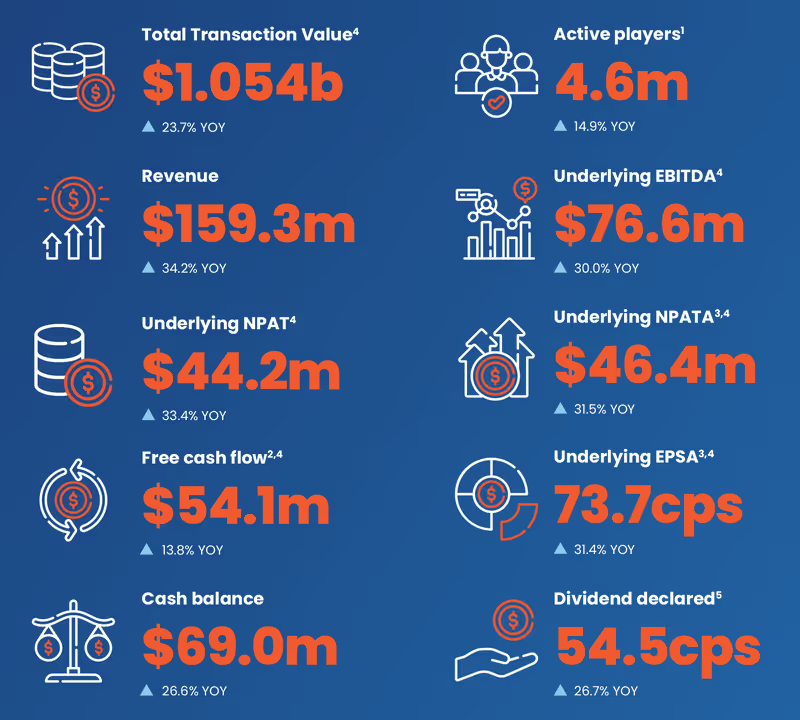Exeter City Council has been using its income from Exeter Community Lottery to pay gambling licence fees and other costs for more than eighteen months while falsely claiming that 60% of ticket sales revenue goes to local community groups.
Contrary to numerous Exeter Community Lottery website point of sale claims, persistently repeated over the course of nearly two years in official council communications, it diverted more than half its first year lottery income into its own coffers and is now keeping a third of this income each year.
At the same time Gatherwell, the aptly-named operator which runs the lottery on the council’s behalf, is receiving more income from ticket sales than all 129 of the voluntary and community groups that have signed up for the Exeter scheme put together, making a gross profit of 33% after local prize pay-outs.
Gatherwell is owned by Australian multinational Jumbo Interactive, whose ticket sales exceeded AU$1 billion for the the first time last year. Its transaction values rose to £88 million, a sevenfold increase over the preceding two years, as it consolidated UK operations focussed on schools, charities and local authorities.
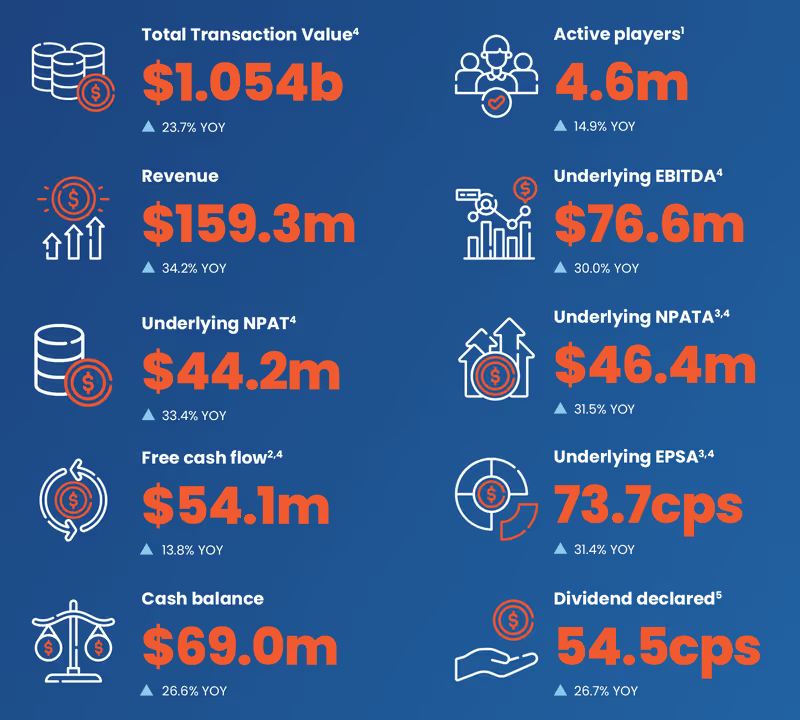 Jumbo Interactive 2024 annual report financial highlights (values in AU$).
Jumbo Interactive 2024 annual report financial highlights (values in AU$).
When the city council agreed to set up the lottery in December 2022 it rushed into the contract after Gatherwell said a £5,000 set-up fee would be waived provided it signed in less than three weeks.
It said that the split of the proceeds from ticket sales would be 60% to “local good causes” and the other 40% to Gatherwell. Gatherwell would pay 3% VAT and the cost of any prizes.
Players would choose between 60% of the price of each ticket going to “a good cause nominated by the council” via its “central fund” and 50% going to a “specified good cause registered with the lottery and selected by the player, with the remaining 10% being allocated to the council’s nominated cause”.
The council also said that gambling license fees and marketing costs would be met from existing budgets, with related staff time largely covered by Community Infrastructure Levy receipts.
An accompanying risk analysis pointed at “the possibility of damage to the council’s reputation, in the unlikely case that the lottery becomes connected to corruption”.
Against this and other reputational risks it weighed two “benefits” – that it already had “a reputation as a dynamic council which leads the way” and that the “key message communicated about a lottery would be that is empowering and enabling communities to help themselves”.
Perhaps to reassure councillors wondering how either might mitigate such risks, it added: “Supporters can be assured that the proceeds will stay in the city”.
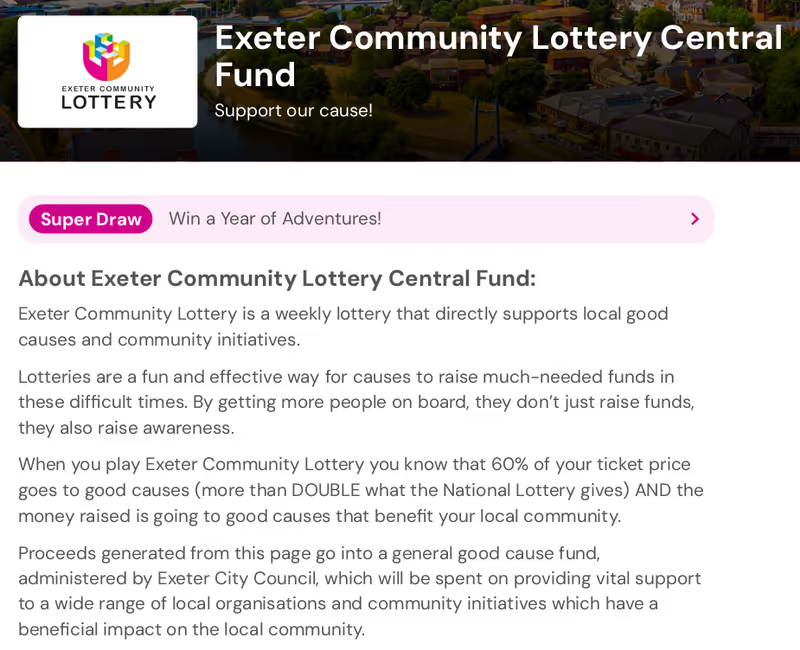 Exeter Community Lottery Central Fund webpage.
Exeter Community Lottery Central Fund webpage.
Twelve months later the council said that the lottery was having a “significant impact” in Exeter.
City councillor Martin Pearce, who had been instrumental in the lottery’s introduction, subsequently said that it had been “an outstanding success”, adding that Gatherwell was “incredibly good value” and that he was optimistic that the lottery would prove to be a “substantial source of income”, although he didn’t say for whom.
Ticket sales, however, which reached 1,685 a week in November 2023 were on their way down. By a fortnight ago, just over eighteen months since the first draw in July 2023, they had fallen to 1,500 a week.
This means lottery ticket sales are now worth £77,500 a year of which Gatherwell takes more than £31,000 and the council gets £16,000 (from its central fund plus 10% of all other ticket sales).
What about the local organisations that are supposed to be the lottery’s main beneficiaries? They currently share £30,700 a year between them, less than Gatherwell gets. But 129 of them have so far signed up, only five of which are raising more than £1,000 a year and another nine more than £500.
The other 115 voluntary and community groups are each raising less than £500 a year, the amount that used to be the council’s standard council ward grant. 30 of them are raising nothing at all.
At the same time Gatherwell is paying out an average of £5,700 a year in Exeter Community Lottery prizes, so it is currently making a gross profit of £25,500 a year – 33% of sales.
(Last October a Newton Abbot resident won a Gatherwell “superdraw” prize, of which twenty have been promoted via the Exeter lottery so far. They include smartphones, laptops, gift cards and games consoles which appear to be promotional giveaways. The winners all appear on the Exeter lottery results page even though the other nineteen were not Exeter lottery players.)
Curiously, while nearly 7,000 free tickets have also so far been given away to Exeter lottery players as prizes, the rate at which local people win does not appear to have increased. Exeter Community Lottery paid out less in local prizes in the past six months than it did in its first six.
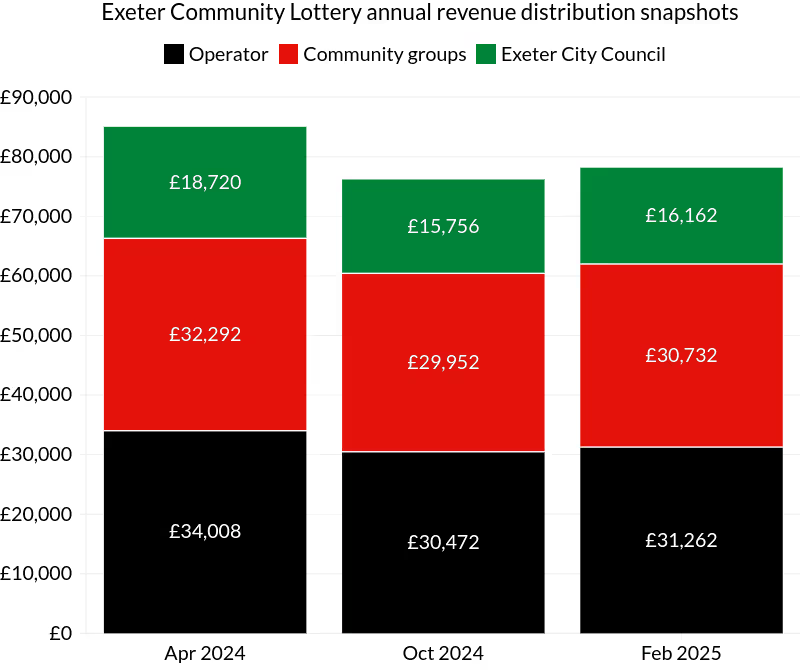 Source: Exeter Community Lottery website data.
Source: Exeter Community Lottery website data.
A city council review of the lottery’s first twelve months was planned for September last year, when some of these iniquities might perhaps have been addressed. However, after appearing in the council executive forward plan five months running, the review was rescheduled for October before disappearing without explanation.
In May a request to refer the review to a council scrutiny committee was submitted. It proposed analysis of direct and indirect council lottery running costs and suggested inviting a Gatherwell representative to the committee meeting to explain what was going on.
When the committee assessed the request it decided that, as the item was (then still) on the September executive agenda, it would be better to consider the request’s merits in October before actually subjecting the lottery to scrutiny at its November meeting instead.
The committee then decided, in October, that “having fewer items on the agenda would allow for more efficient scrutiny” and so agreed to defer lottery scrutiny again. This time no date was set.
Councillor Matt Vizard, the executive member who is responsible for the lottery, was at the meeting to present another report. This touched on the lottery in passing, repeating the “60% of proceeds go to good causes” mantra, as did an attached briefing note.
In response to a query from another councillor, who asked whether a lottery operator headquartered a bit closer to Exeter than Australia might not be preferable, he pointed out that Gatherwell’s contract was due for review in July 2025, as if to say that other options could be considered then.
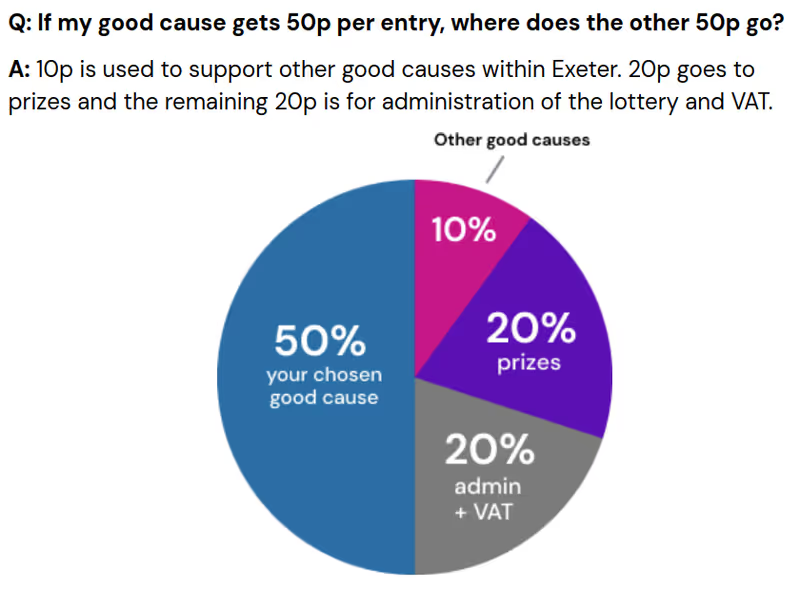 Exeter Community Lottery revenue distribution FAQ.
Exeter Community Lottery revenue distribution FAQ.
The following month Jo Yelland, the council director who is responsible for the lottery, presented a community grants programme report to the council executive committee.
The lottery was not discussed. But a single line in the report, which was largely focussed on finding money to pay the escalating Wellbeing Exeter bill, in a section on the “resource implications” of its recommendations said: “Officer resources will continue to be needed to facilitate the Exeter lottery, and these costs will be met through existing resources and income from the lottery.”
It seems no-one noticed this apparent departure from the council decision that all its lottery income would go to local community groups, and no-one remarked on it at the following full council meeting that approved the decision either.
Curiously, even though Jo Yelland knew by then that the council’s first year lottery income came to £17,500, her report “estimated” it would be £21,000 in 2024-25 and 2025-26. It also said the council’s ongoing lottery costs would be £5,000 a year despite her knowing that these would come to more.
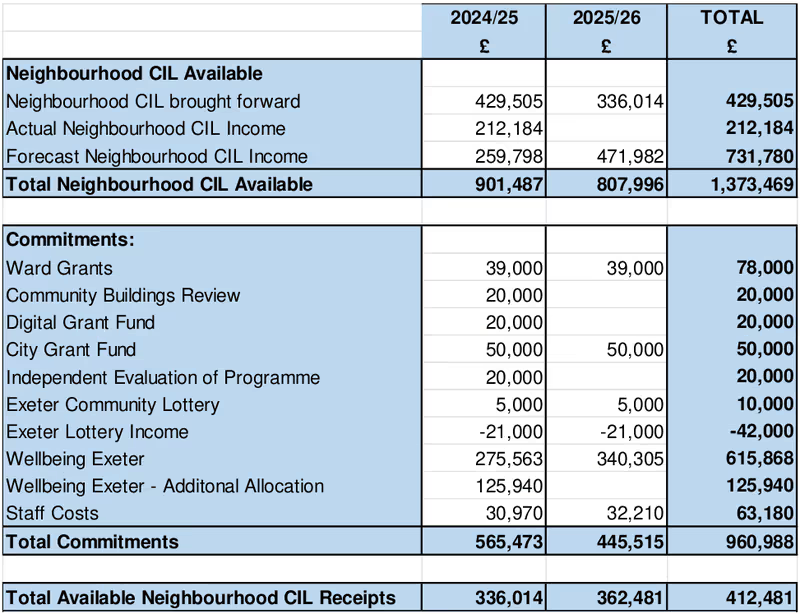 Exeter Community Grants Wellbeing Exeter funding breakdown. Source: Exeter City Council.
Exeter Community Grants Wellbeing Exeter funding breakdown. Source: Exeter City Council.
Then, at the end of last month, as requested last May, the council scrutiny committee finally met to consider the lottery. No Gatherwell representative attended, nor was there any mention of one.
Jo Yelland didn’t attend either, so a council officer who had only joined her team a couple of weeks earlier presented her report instead.
Revealing that the lottery had extended its reach even further into the council’s central fund pot than her previous report had said, it admitted that its “licence fees and marketing costs have been met through the income raised so far from ticket sales and the income to the central community fund”.
It added that the lottery’s “staff administration costs are estimated at around £4,000 a year” and that its year one non-staffing costs came to more than £6,000 of which just under £4,000 were marketing costs and another £2,000 were gambling license fees.
(The council previously said, both in response to a freedom of information request and in a separate report, that the initial setup costs actually came to £6,558 including £2,564 in Gambling Commission and Lotteries Council fees – making the first year costs to the council in excess of £10,500.)
Jo Yelland’s report then said that “annual fees are expected to be in the region of £1,200 to £1,300”, adding: “Now we are clear on the commitment, staffing costs estimated at around £4,000 will be deducted from the revenue into ECC”.
Despite revealing that £10,500 had been deducted from the council’s lottery income in year one and that £5,300 a year would be deducted from the council’s lottery income from year two onwards, the report then repeated the “60% of proceeds go to good causes” mantra as if none of the deductions had occurred, with a table breaking down the figures for good measure.
It also appeared to assume that the council will continue with the lottery regardless when the Gatherwell contract comes up for renewal in July.
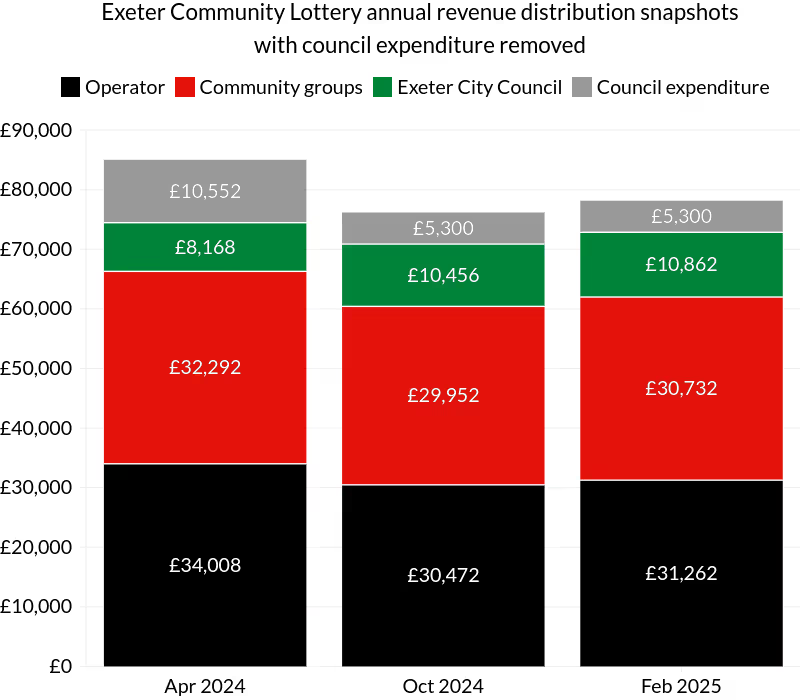 Source: Exeter Community Lottery website data.
Source: Exeter Community Lottery website data.
During the meeting several councillors queried the figures in Jo Yelland’s report. Matt Vizard said he would need to look at them more closely and would have to go back and check the report which proposed the lottery in the first place. Simon Copper, the council’s legal services lead, also said he would have to look into the matter.
The council meeting minutes recorded this as: “The Head of Service, Monitoring Officer and Portfolio Holder for Climate, Ecological Change and Communities agreed to investigate, outside the meeting, the difference in percentage given to good causes as reported.”
Three weeks later Matt Vizard said, at a full council meeting, that he had asked council officers to follow up, that a review was “still under way and taking place at speed”, and that yet another report to a scrutiny committee meeting would be “forthcoming”.
Another week has since passed. The Exeter Community Lottery website, for which the council is responsible as the gambling licensee, still presents the “60% of proceeds go to good causes” claim on around fifty of its pages, including the council’s own central fund promotional page.
Around fifty of the 66 lottery-promoting stories the council has published as official council news also still make related claims, including that a “guaranteed 60% of the ticket proceeds will go to good causes” and that “players can see exactly where every penny goes on the lottery website”.
Yet, according to Jo Yelland’s reports, only 46.7% of the ticket proceeds went to good causes in the lottery’s first year of operation, then 53% from year two onwards.
It appears that the council has materially misled lottery players for the past eighteen months, in breach of Gambling Commission rules. At the same time it has enabled an Australian multinational to profit from local voluntary and community sector support while short-changing the city itself.
Read full article at source
Stay informed about this story by subscribing to our regular Newsletter
